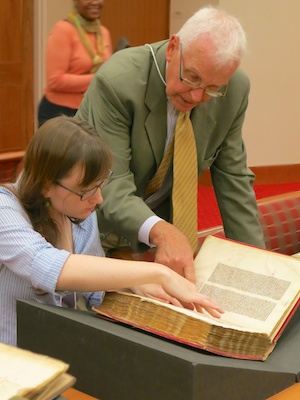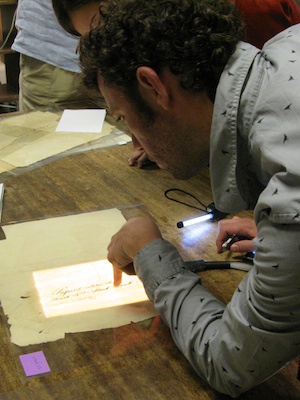The Andrew W. Mellon Fellowship of Scholars in Critical Bibliography
Rare Book School has received an $896,000 grant from The Andrew W. Mellon Foundation to fund a new three-year fellowship program at RBS, the Andrew W. Mellon Fellowship of Scholars in Critical Bibliography. The aim of the fellowship program is to reinvigorate bibliographical studies within the humanities by introducing doctoral candidates, postdoctoral fellows, and junior faculty to specialized skills, methods, and professional networks for conducting advanced research with material texts. View October 2012 press release
The 20 RBS-Mellon Fellowships for 2013–2016 have now been awarded. View March 2013 press release
- 2013–2016 RBS-Mellon Fellows
- Names and institutional affiliations of 2013–2016 RBS-Mellon Fellows (PDF)
- Biographical information for 2013–2016 RBS-Mellon Fellows (PDF)
If you would like to be notified regarding similar fellowship opportunities at Rare Book School in future, please fill out an information request form.

Overview of Fellowship Program
During their three-year fellowship tenure, fellows will receive intensive, hands-on training at RBS, and will work with mentors from the bibliographical community who will guide their archivally based scholarship, and help connect them with professionals in allied fields. The fellowship program will include the following activities:
- three courses at Rare Book School, with travel and research stipends
Mellon Fellows will study with Rare Book School's distinguished international faculty during the School's weeklong seminar-style courses, once per year for three years. During their courses, fellows will receive hands-on, expert instruction by RBS faculty on interpreting the material forms of textual artifacts, from medieval manuscripts and early American hand-press books to born-digital materials. In these 30-hour courses, fellows will have the opportunity to handle, analyze, and interpret materials from RBS's c.80,000-item collection, from the University of Virginia's Special Collections, and, in some cases, from the Library of Congress, The Morgan Library & Museum, and other major special collections in the United States. One course, on the topic of critical bibliography, will be required; the other two courses will be chosen by fellows to suit their research interests. Fellows' expenses for their three RBS courses will be covered by the fellowship. In addition, they will receive a $6,000 stipend to cover travel, meals, lodging, course materials, and research-related needs. - seminars on critical bibliography
Fellows will discuss bibliography and its potential place in humanities teaching and research during intensive seminars led by prominent humanists as part of their two-day orientation to the program. Fellows will continue to consider the questions raised during these seminars during their critical bibliography course at RBS. Fellows' expenses for attending the orientation at the University of Virginia in Charlottesville, VA, and for attending their course on critical bibliography, will be covered by their fellowship. - symposia on critical bibliography
Fellows will each be assigned $2,000 for use in hosting academic symposia at their home institutions. These symposia will enable fellows to invite distinguished scholars who are model practitioners of bibliography, book history, and related fields to enrich the ongoing critical conversations in their departments. Fellows will be expected to host at least one event, with a second (supported by additional funding) being optional. - bibliographical field schools
Mellon Fellows will attend three-day "bibliographical field schools," targeted visits to major special collections in metropolitan areas (New York, Philadelphia, Boston, Chicago, and more). The field schools will be tailored to fellows' research interests, and will provide them with opportunities to consult leading curators regarding resources pertinent to their research. Fellows will be encouraged to extend their stay to conduct research. Fellows' expenses for travel, meals, and lodging during the field schools will be covered by their fellowship; attendance at one field school will be required, with a second being optional. - collaborative research trips
To foster a community of scholarship for critical bibliography, $1,500 of additional funds will be made available to fellows who wish to organize research trips to collections other than the ones visited during the bibliographical field schools, including international collections, in collaboration with other fellows in the program. Fellows will be granted funds to support travel and lodging for their research trip.

Eligibility
Applicants eligible for the 2013–2016 Mellon Fellowship were, as of December 1, 2012:
- doctoral candidates (i.e., graduate students who had completed their qualifying exams),
- postdoctoral fellows, or
- junior (i.e., nontenured) faculty.
The following classes of applicants were ineligible for a Mellon Fellowship:
- students and faculty presently affiliated with institutions located outside the United States
- tenured faculty
- students and faculty whose primary professional focus lay outside of the humanities, including those in the areas of Library and Information Science*
- anyone who had attended three or more courses at RBS
- past or present members of RBS’s full-time, year-round staff
*Rare Book School plans to seek funding to run a program similar to the Mellon Fellowship, but centered on students, librarians, curators, and faculty in Library and Information Science, in the near future.
Application Process
Applicants were evaluated primarily on the basis of:
- their demonstrated academic achievements
- their capacity for intellectual leadership
- the strength of their argument for participating in the program
- the interpretative force of their written work
The deadline for application has passed, and all the available fellowships have been awarded.
Please email Mellon Fellowship Program Director Donna Sy with questions regarding the fellowship program, eligibility, and applications.
Application FAQ
- May I submit a generic "dossier service" recommendation letter?
We recommend that you ask those providing your recommendations to respond to the prompt provided in the recommendation letter cover sheet. If your recommenders are unable to provide a customized recommendation letter, we will accept generic letters, but such letters are less likely to provide strong support for your application. - What are you looking for in the writing sample?
We hope that you will submit a writing sample that represents your academic writing at its finest. The writing you submit need not have been previously published, and need not be on bibliographical or book-historical topics (though papers on such topics are, of course, welcome). - Do you have any requirements for how responses to the essay questions must be formatted?
We would appreciate it if you would start each essay question on a new page, and make sure that each page is numbered and includes your name on it in a header or footer. You do not need to include the essay prompt in your response. - May I submit letters of recommendation or writing samples in foreign languages?
We ask that you submit two letters of recommendation and a writing sample in English. If you feel that your strongest recommendation letter and writing sample must be in a foreign language, you may include them as a supplement to your application, but we cannot guarantee that our selection committee members will be able to give full consideration to materials that are not in English. - I am about to advance to candidacy for the doctoral degree, but it will be just after 1 December 2012. May I still apply?
You may apply if you will have completed your exams by 1 February 2013; we will consider your application provisional until we have received certification from your department that you have advanced to candidacy. If you will not complete your exams by that date, you are not eligible to apply at present; we hope to be able to select another cohort of fellows next year, if funding permits, and so we hope you will consider applying at that time.
Advisory Board for The Andrew W. Mellon Fellowship of Scholars in Critical Bibliography
- Ann Blair (Harvard College Professor, Henry Charles Lea Professor of History)
- James Green (Librarian of the Library Company of Philadelphia)
- Charles Henry (President, Council on Library & Information Resources)
- Jerome McGann (John Stewart Bryan University Professor, University of Virginia)
- Patricia Meyer Spacks (past President, MLA and the American Academy of Arts & Sciences)